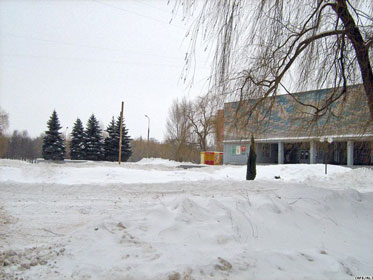Homel: new mass events rules – old problems for organizers

Plaza outside the Palace of Culture "Vipra" of the Belarusian Association of the Deaf, the only place in the city where the decision of the executive committee allows holding public events
In early September, a new decision of Homel city executive committee on mass events came into force. The authorities say that it is meant to “expand the list of places for public events, as well as to improve the interaction between the organizers of public events and local authorities.” However, although the number of locations has increased (two sites instead of one), they are located in places that will make potential participants in the pickets or rallies hire a vehicle to travel to the locations. "Local officials have authorized two new places, showing liberalization in this regard. But if you look at these places, they are even worse, because they are on the outskirts of the city, where you can meet a live person only when he is walking his dog," said human rights defender Leanid Sudalenka.
The “old” rules allowed holding public events in the only place, on a plaza outside the Palace of Culture "Vipra" of the Belarusian Association of the Deaf, including demonstrations and marches (see photo). In practice it was impossible to stage a procession or a demonstration in a pitch 100 by 100 meters. “Often, in the lawsuits against the city executive committee’s decision on the matter, even the judges were surprised,” says the human rights activist.
Leanid Sudalenka analyzes the situation with a requirement to sign contracts, when three or five people standing in a picket should be guarded by a riot squad, an ambulance crew and janitors. Challenging the court’s obligation to enter into these agreements, the human rights defender draws certain parallels. For example, what would happen if the city officials adopted a decision according to which each of the passengers on public transport before getting on a bus would be obliged to sign a contract for the maintenance of public order during the trip? Besides, the bus should be follow by an ambulance (in case people get sick), the passenger would have to pay for a clean-up of the vehicle at the end of the day.
“Absurd? Equally absurd are the new restrictions. When I talked about this in the courtroom, everyone laughed, even an official from the city executive committee,” says the expert.
Over 30 complaints from Homel region are now being considered by the UN Human Rights Committee, which, among other things, demand to cancel the “old” decision on mass events. The Committee is communicating with the Belarusian government on the complaints, having to constantly explain to Europeans why the city with half a million of population has only one place for peaceful assemblies of citizens, and why people have to pay for permission to hold them. In addition, there are findings of the Venice Commission, which says that the law on mass events does not ensure the appropriate right of everyone to freedom of peaceful assembly and, as a consequence, to freedom of expression. “I think that all of these circumstances prompted the adoption of a new decision. But it failed to fundamentally change the situation,” says Leanid Sudalenka.

















